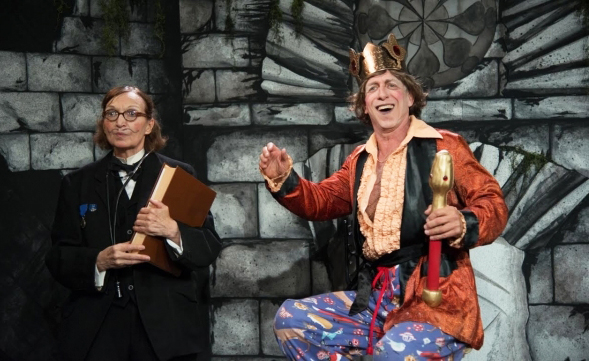
Exit the King is an anomaly. It’s a major work by Eugene Ionesco, who is one of the fathers of Theatre of the Absurd.
And absurd, to most people, means comedy.
But the play is painful to watch. Excruciating. I would suggest that this is a comedy only in the manner of Dante’s Divine Comedy or Saroyan’s The Human Comedy.
Actually, Ionesco never claimed to be humorous. He declined to use the word absurd and preferred to call his oeuvre Theatre of Derision. His language is surrealistic as he speaks of serious issues.
Exit the King opens with a kingdom in ruins. The palace is crumbling in disrepair, the nation is deep in debt, mountains are eroding. On top of this, a doddering monarch is informed that he’s dying.
What Ionesco presents here is the total disintegration of society and the death of its leaders. Going even beyond that, he says that even the memories of us will fade and die. He predicts “a great and mighty nothingness.” Exit the King is a contemplation of helplessness and void.
In this production by the Idiopathic Ridiculopathy Consortium, a ten-year-old company devoted to absurdist works, King Berenger (Robb Hutter) has accomplished great things in his long life. But now he is informed that “You’re going to die in an hour-and-a-half.†Queen Marguerite, his first wife (played by Patricia Durante) archly reports: “You’re going to die at the end of the play.”
Berenger refuses to believe it. His counselors remind him that everybody dies; “nobody living has,” he trenchantly replies. Then he reconsiders. Yes, he’s going to die some time, but today? Not really.
This omnipotent monarch thinks he can control everything in his kingdom. As such, he represents humankind where almost everyone puts themselves at the center of their thoughts and tries to control everything that happens to them.
Formerly he reigned over millions of subjects and even controlled the weather. Now the heater is broken, the washing machine has been sold to pay off national debts, and most of his population has disappeared. Ionesco’s 1962 script sounds prescient as a character announces “global chilling” and the queen complains about “all those disastrous wars.”
Marguerite tries to make Berenger face reality while Berenger’s second wife, Marie, tries to shield him from the pain of facing imminent death.
Tina Brock’s production runs straight through instead of in two acts as written. It’s still too long. Ionesco repeated his points too often. Yet there’s a touching final scene in which Marguerite becomes like a nurturing mother to a confused child, the dying king.
Hutter plays Berenger with querulous and desperate impatience. Durante is imperious as Marguerite while Anna Lou Hearn is cute and stereotypically blonde as the melodramatic second wife. Susan Giddings is an unpitying doctor, Jenna Kuerze a sassy servant girl and Bob Schmidt is a tower of quiet strength as The Guard.
Below, Exit the KIng cast photo by Johanna Austin:
Read other reviews on The Cultural Critic